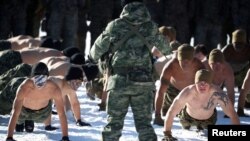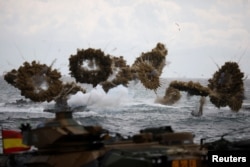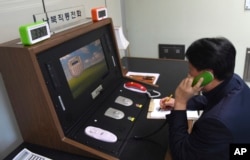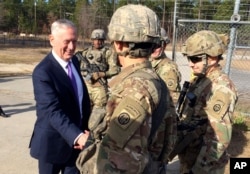The United States and South Korea have decided to delay joint military exercises until after the Pyeongchang Winter Olympics next month, officials from both countries said Thursday.
South Korea’s Blue House (executive office) said the decision came during a phone call between U.S. President Donald Trump and President Moon Jae-in.
A White House statement said both leaders “agreed to de-conflict the Olympics and our military exercises so that (the) United States and Republic of Korea forces can focus on ensuring the security of the games.”
U.S. Defense Secretary Jim Mattis downplayed the delay to reporters Thursday, calling it a “practical matter.” He said the exercises would resume after the March 9-18 Paralympic Games ended.
Earlier on Thursday, Pentagon spokesman Army Col. Robert Manning said, “The Department of Defense supports the president's decision and what is in the best interest of the ROK (Republic of Korea) — U.S. Alliance.”
The annual joint military exercises known as Foal Eagle are usually held between February and April and are one of the world’s largest such drills. The exercises combine ground, air, naval and special operations to increase readiness to defend South Korea and the region. North Korea routinely objects to the exercises.
'Mistakes of the past'
During Thursday’s phone call, the White House said President Trump and President Moon “agreed to continue the campaign of maximum pressure against North Korea and to not repeat mistakes of the past.”
Earlier, Trump tweeted that his “firm” and “strong” leadership was the impetus for a scheduled resumption of talks between North and South Korea.
“With all of the failed ‘experts’ weighing in, does anybody really believe that talks and dialogue would be going on between North and South Korea right now if I wasn’t firm, strong and willing to commit our total ‘might’ against the North. Fools, but talks are a good thing!”
On Wednesday, North and South Korea reopened a cross-border hotline that had been shut down since 2016 after North Korean leader Kim Jong Un offered to send a team to the Winter Olympic Games hosted by the South next month. After the reopening, South Korea confirmed that officials from both countries talked for 20 minutes, according to The Associated Press.
A Seoul official says both Koreas have agreed to hold their first talks in more than two years next Tuesday to discuss cooperation with the Games and improve diplomatic relations.
International pressure brings results
Defense Secretary Mattis said the talks “clearly are the result of the amount of international pressure.”
“It is difficult for me to disassociate that he’s now wanting to negotiate on any issue, with months and months of unanimous United Nations Security Council effort,” he told reporters at the Pentagon Thursday.
Mattis also warned that it was unclear whether Kim’s recent actions were “a real olive branch” or just a one-time move.
North Korea has drawn increased scrutiny from the international community in recent months because of a number of missile launches and its sixth and most powerful nuclear test.
Pyongyang has dismissed new sanctions and tough talk from the Trump administration as it continues to develop its weapons program, which North Korea has said is being developed to defend against U.S. aggression.







